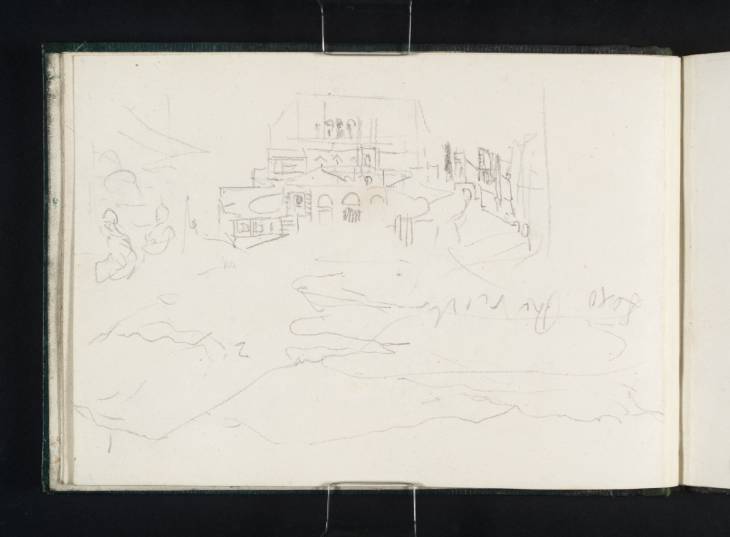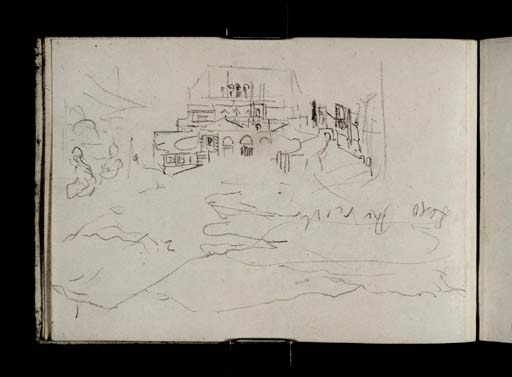Joseph Mallord William Turner The Palazzo Farnese, Caprarola; Lago di Vico 1828
Image 1 of 2
Joseph Mallord William Turner,
The Palazzo Farnese, Caprarola; Lago di Vico
1828
Folio 7 Verso:
The Palazzo Farnese, Caprarola; Lago di Vico 1828
D21778
Turner Bequest CCXXXVI 7a
Turner Bequest CCXXXVI 7a
Pencil on white wove paper, 125 x 171 mm
Inscribed in pencil by Turner ‘Lago Re[...]’ towards centre right, upside down, and ‘1’ and ‘2’, towards bottom left, upside down
Inscribed in pencil by Turner ‘Lago Re[...]’ towards centre right, upside down, and ‘1’ and ‘2’, towards bottom left, upside down
Accepted by the nation as part of the Turner Bequest 1856
References
1909
A.J. Finberg, A Complete Inventory of the Drawings of the Turner Bequest, London 1909, vol.II, p.723, CCXXXVI 7a, as ‘Lake among mountains; buildings, &c’.
1984
Cecilia Powell, ‘Turner on Classic Ground: His Visits to Central and Southern Italy and Related Paintings and Drawings’, unpublished Ph.D thesis, Courtauld Institute of Art, University of London 1984, pp.304 note 37, 436.
1987
Cecilia Powell, Turner in the South: Rome, Naples, Florence, New Haven and London 1987, pp.[140], 206 note 25.
As identified by the Turner scholars Cecilia Powell and Roland Courtot, the upper half of this page is dominated by the Palazzo Farnese.1 This Renaissance palace lies to the north of Caprarola, overlooking the town from an elevated hilltop position.2 Turner depicted this subject in a dozen works in the sketchbook; see under folio 4 verso (D21772) for an extended commentary and a list of relevant works.
Turner’s viewpoint for this sketch was facing north-west from the top of the Via Dritta, now known as the Via Filippo Nicolai. This central thoroughfare leads up the slopes towards the Palazzo Farnese. It was designed in the sixteenth century by the architect Giacomo Barozzi da Vignola, who also transformed the Palazzo Farnese from a fortified edifice into a Renaissance villa.3 Turner’s rendering of the palace’s main south-eastern façade indicates its unusual pentagonal shape, together with the curved double stairway ascending to a balustraded terrace. Two seated figures on the Piazza Farnese are shown in the foreground to the left.
Beneath, inverted relative to the sketch above, is a loose outline of Lake Vico in northern Lazio. Turner’s inscription reads ‘Lago’ and possibly ‘Ronciglione’, a neighbouring town that also borders the lake. In the bottom-left corner, parts of the study are labelled ‘1’ and ‘2’, implying a more extended vista. The peak labelled ‘1’ is presumably Monte Venere, a volcanic summit on the northern banks of the lake. Turner’s viewpoint was presumably facing west from near Caprarola. For further commentary on Lake Vico and a list of relevant views in the sketchbook, see under folio 3 verso (D21770).
Hannah Kaspar
December 2024
Powell 1984, p.436; Roland Courtot, ‘12. Vers Rome: “Carnet de Viterbe et Ronciglione” (TB CCXXXVI)’, Carnets de voyage de Turner, accessed 15 July 2024, https://carnetswt.hypotheses.org/2312 .
‘Palazzo Farnese’, Visit Caprarola, accessed 15 July 2024, https://visitcaprarola.it/en/luoghi-da-visitare/edifici-storici/palazzo-farnese/ .
‘The Straight Way to Caprarola’, Caprarola.Com, accessed 19 July 2024, https://www.caprarola.com/palazzo-farnese/la-via-dritta.html .
How to cite
Hannah Kaspar, ‘The Palazzo Farnese, Caprarola; Lago di Vico 1828’, catalogue entry, December 2024, in David Blayney Brown (ed.), J.M.W. Turner: Sketchbooks, Drawings and Watercolours, Tate Research Publication, February 2025, https://www


